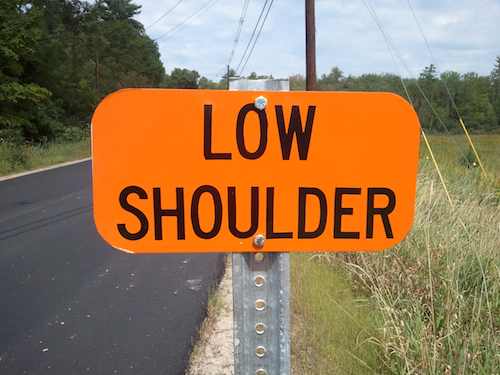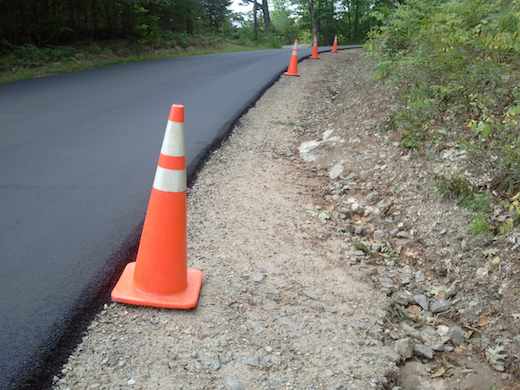
September 2, 2011
Meredith New Hampshire Road Defects
I live in Meredith, New Hampshire. The roads all-in-all are in pretty good shape. But every now and then I'll come across a defect that the public works department has not yet attended to.
One part of road maintenance that Meredith tends to overlook is road shoulders. The shoulder of a road is that part of the ground that's immediately adjacent to the paved surface.
In many places the shoulder is crushed gravel. On some roads the shoulder may be just regular soil. In places like this, you may see signage that says Soft Shoulder. This means if you drive on the shoulder, you could sink into soft soil and get stuck.
Shoulders serve an important function with respect to roads. They're both a structural component of roads, and they're a safety feature.
Strong gravel shoulders adjacent to paved road surfaces help provide lateral support to the pavement. If the shoulder is low and a car or heavy truck drives over the edge of the pavement, the pavement can crack and fall away. You can clearly see this has happened in this photo I took in Meredith, NH during the summer of 2011.
If pavement breaks away on the edge of a road, it can start to create a crescent defect which can cause tires to blow out when they hit the jagged pavement edge.
 Civil engineers and public works directors are aware of the need for road shoulders to be flush with the surface of the road pavement. This is why you see signs like this one that warn drivers of the road defect. This sign was installed because the government knows that low road shoulders cause problems. If low road shoulders were not problematic, there'd be no need for the sign. That's a very very important thing to keep in mind.
Civil engineers and public works directors are aware of the need for road shoulders to be flush with the surface of the road pavement. This is why you see signs like this one that warn drivers of the road defect. This sign was installed because the government knows that low road shoulders cause problems. If low road shoulders were not problematic, there'd be no need for the sign. That's a very very important thing to keep in mind.
This orange-colored Low Shoulder sign is a temporary one in place on Camp Waldron Road in Meredith, NH erected for the duration of a repaving project that's happening right now. The sign will be removed once the project is complete, but it's VERY important for you to realize why it was put up. Among other things, road signs warn drivers of conditions that could cause problems.
This sign is undoubtedly serving two purposes, The Town of Meredith doesn't want a driver or car hurt because the shoulders were low. You can easily lose control of a car if the right-side tires drift off the pavement and drop down on a low shoulder. What frequently happens is the driver steers and over corrects to get the tires back on the pavement. The car can then cross the center line and all sorts of bad jujumagumbo can happen.
No doubt the town doesn't want the fresh pavement damaged between the time it's laid and the crews can install the crushed-gravel shoulder material. The sign is intended to alert drivers to really pay attention while they're on the new blacktop.
Chronic Low Shoulder Areas
 In countries like the USA where we drive on the right side of the road, you frequently see low shoulders on inside right turns like the one in this photo. The reason is simple. Cars tend to cut corners short and the wheels drift off the pavement. This causes friction and the gravel can spin loose.
In countries like the USA where we drive on the right side of the road, you frequently see low shoulders on inside right turns like the one in this photo. The reason is simple. Cars tend to cut corners short and the wheels drift off the pavement. This causes friction and the gravel can spin loose.
You do this several times a day or hour and pretty soon the shoulder starts to get eroded and is not flush with the pavement.
Public works directors know this. It's Road Maintenance 101. It's really just part of their ordinary week-to-week work to make sure that the shoulders are flush with the road surface. This should be on a monthly checklist of routine tasks to do. What's more, they know exactly where low shoulders are most likely to happen. How hard is it to send out a crew on a routine basis to check the trouble locations and repair them as necessary?
Government Responsibility for Damages
Did you know that if you have a road defect in your town, city or state you may have a state law like New Hampshire does? These laws are pretty common around the USA.
If there is a road defect like a pothole, a low shoulder, a bridge out, or any other defect that may cause harm to a car or a person, the government entity responsible for the road becomes completely responsible for damages if they are properly notified of the defect. Other sections of the law define what proper notification is.
In New Hampshire, if there is a real deficiency in a road and it's reported to the police or other officials in a proper format, the town or city is obligated to immediately take certain steps to remedy the situation. Read New Hampshire's RSA 231:91.
Many people are unaware of these laws. This summer I received a check from the Town of Meredith because I was able to produce proof that a pothole had been in the roadway for quite some time and it was neglected by the town. My daughter hit this pothole and caused over $1,300 damage to our car. Luckily she was not injured nor did she cause an accident that hurt someone else. The Town of Meredith really dodged the bullet with respect to this incident. The costs they could have been responsible for could have risen easily to six or seven figures if everyone would have lawyered up in the event of a death caused by the silly pothole.
I wasn't the only person to succumb to this defect. Within days of my daughter blowing out the right side tires and bending both fancy aluminum wheels, another driver did the exact same thing to his car! I happened to be driving by and stopped and talked to him as he was preparing to change both flat tires he received from the same exact pothole.
We both wondered how many other drivers had damaged their cars. My guess is several. All because the public works department failed to properly maintain the road pavement and road shoulder. The truth is the cost to add the needed crushed gravel to the pothole on the edge of the road that caused our damages was probably $10. It would have taken a worker about ten minutes of time to deal with this one road issue.
The bottom line is this: If you see REAL defects in your roadways, you need to properly inform your government officials so they take action. This does two things. It minimizes the chance cars and people will be damaged, and it puts the government on the hook for damages that may happen until such time as they fix the defect.
If you ever have an issue where you or your car is damaged, be sure to take the time to investigate if a report has come in. It may not be easy to get this information, but it could save you hundreds of dollars.
Workers Need to Do Their Jobs
It's really sad that it has to be this way. I feel the public works director for each town or city should do regular inspections of every road to ensure there are no defects. That's part of his responsibility.
Sure, in the winter potholes can erupt that weren't there the day before. But many defects like low road shoulders, spring and summer potholes, edge pavement defects, etc. are clearly visible to police officers or any other government employee that's traveling the roads.
Each employee, whether they're garbage collectors, police, building inspectors, etc. are part of the team. They should be an extra set of eyes for the public works department. And there can be reciprocity. If the publics works employees see things as they travel the roads that can help other municipal departments, they should inform them of the observations.
We, the taxpayers, should not have to report these problems except in rare cases when the defect happens quickly and unexpectedly.
Posted by Tim Carter at September 2, 2011 4:07 PM
